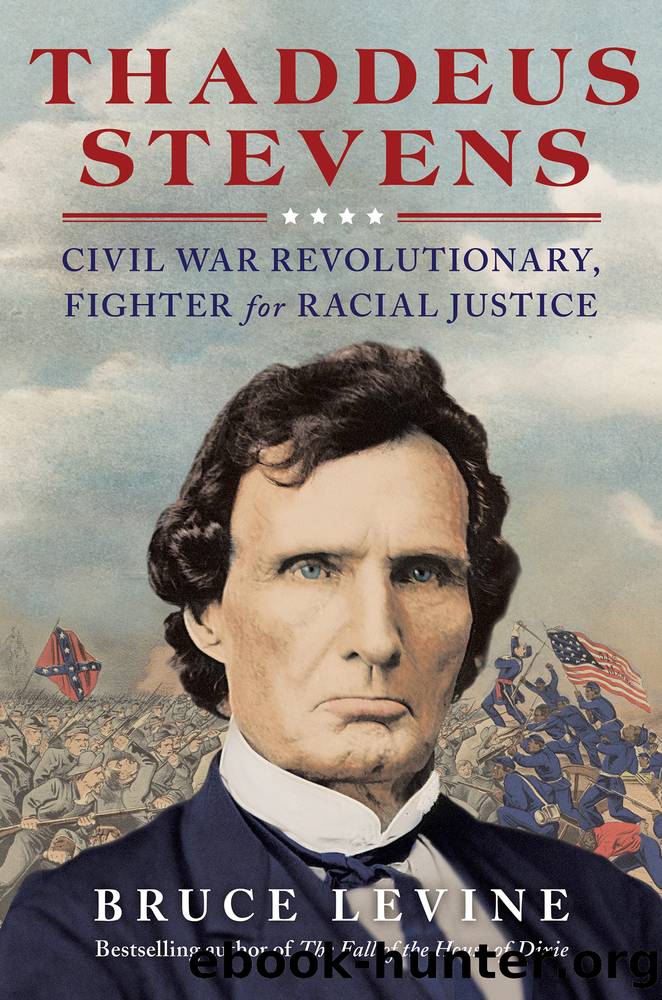Thaddeus Stevens by Bruce Levine

Author:Bruce Levine
Language: eng
Format: epub
Publisher: Simon & Schuster
Published: 2021-03-02T00:00:00+00:00
CHAPTER SEVEN Stevensâs Civil War, Part II
For Black Union Troops and Nationwide Abolition
Confiscation and emancipation naturally raised another major questionâwhether to employ freed slaves as soldiers. From the start of the war, black men in the North had been trying to don Union uniforms. And in the summer of 1861 Thaddeus Stevens foresaw the day when âevery bondman in the South⦠shall be called upon to aid us in war against their masters, and to restore this Union.â
But, following national policy in force since the 1790s, the government long rejected that idea and those initiatives. Most northerners were sure that black men could not make good soldiers; deep-seated racial ideology told them so. Nor did most white men wish to serve alongside black men in anything like the same status. That would insult their racial pride and presumably make it more difficult to recruit or keep whites in the ranks. Widespread initial expectations of an early Union victory made it easy to avoid reconsidering that policy. As a member of Lincolnâs secretarial staff recalled, âso many of us, even of those opposed to slavery, found it hard to approve of what was doubtless so wise, so necessary a policy as the arming of the blacks.â More than a year into the war, Lincoln assured an old friend that ânone are to be armedâ because âit would produce dangerous & fatal dissatisfaction in our army, and do more harm than good.â1
Three factors eventually combined to change the presidentâs mind. The first was the warâs stubborn refusal to correspond with optimistic expectations about it. It became ever clearer that defeating the rebellion would take much more time and require far larger armies than most northerners had foreseen. As the need for numbers grew, the question naturally arose, where could the additional soldiers be found? The second factor was the pressure and example of free blacks and emancipated slaves. With the aid of a few bold Union officers, some black men demonstrated in action the value of changing Union policy. Third, Thaddeus Stevens and other radical Republicans in Congress pressed Lincolnâs government to recognize and accept the logic of the situation, demanding that it not only accept black men into its armies but vigorously seek to recruit them.
As General Benjamin Butlerâs conduct at Fort Monroe back in 1861 portended, practical challenges to conservative policy toward slavery often arose from within the military. Although most members of the countryâs officer corps were politically conservative, some in the military machine did come to appreciate the war effortâs requirements. At the beginning of December 1861, Lincolnâs secretary of war, Simon Cameron, drafted a report that pointed toward a new policy. Cameron was far from a radical politically, but his responsibility to oversee the war effort had led him to face some hard truths. âIt is clearly a right of the Government to arm slaves when it may become necessary as it is to take gunpowder from the enemy,â his draft read in part. It followed for
Download
This site does not store any files on its server. We only index and link to content provided by other sites. Please contact the content providers to delete copyright contents if any and email us, we'll remove relevant links or contents immediately.
Einstein: His Life and Universe by Walter Isaacson(1330)
Finding Freedom: Harry and Meghan and the Making of a Modern Royal Family by Omid Scobie & Carolyn Durand(1186)
Promised Land (9781524763183) by Obama Barack(1160)
Compromised by Peter Strzok(1075)
Finding Freedom by Omid Scobie(1066)
JFK by Fredrik Logevall(1007)
Freedom by Sebastian Junger(644)
Salford Lads: The Rise and Fall of Paul Massey by Bernard O'Mahoney(592)
The Russia House by John Le Carré(570)
Kremlin Winter by Robert Service(535)
Day of the Dead by Mark Roberts(521)
Graveyard (Ed & Lorraine Warren Book 1) by Ed Warren & Lorraine Warren & Robert David Chase(514)
A World Ablaze by Craig Harline(512)
Flying Tiger by Samson Jack(508)
Joe Biden: American Dreamer by Evan Osnos(499)
Melania and Me: The Rise and Fall of My Friendship With the First Lady by Stephanie Winston Wolkoff(482)
100 Things Successful Leaders Do by Nigel Cumberland(481)
The Irish Buddhist by Alicia Turner(480)
The Mission by David W. Brown(465)
